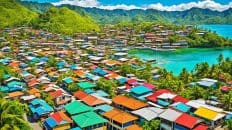Have you ever dreamed of living in a tropical paradise? Imagine waking up to breathtaking landscapes, embracing a vibrant culture, and being part of a welcoming community. The Philippines offers all of this and more for expats seeking a life abroad. But what does it really mean to be a part of the Philippines expat community? How does one navigate the challenges of expat living in the Philippines?
In this comprehensive guide, we will provide valuable insights into the Philippines expat community, offering tips and advice on various aspects of expat life, including cost of living, transportation options, healthcare, culture, education, and employment opportunities. Whether you’re considering a move to the Philippines or are already a part of this diverse community, this guide is a must-read that will help you make the most of your expat experience.
Key Takeaways:
- Discover the affordable cost of living in the Philippines, making it an attractive destination for expats.
- Explore transportation options and learn how to navigate the busy city streets.
- Understand the healthcare system and the importance of health insurance for expats.
- Learn about the safety and security considerations for expats living in the Philippines.
- Join expat communities and social networks to connect with like-minded individuals.
Cost of Living in the Philippines
Living as an expat in the Philippines offers an affordable and fulfilling experience. With a budget of around $1000 to $1500 per month, expats can enjoy a comfortable lifestyle that includes accommodation, food, transportation, and entertainment. This budget allows for dining out, exploring the country’s natural beauty, and immersing oneself in the rich cultural activities available in the Philippines.
Expats who choose to live in the Philippines can enjoy:
- Affordable housing options
- Reasonably priced food and groceries
- Accessible and budget-friendly transportation
- A wide range of entertainment options
Living in the Philippines as an expat provides an opportunity to experience a high quality of life without breaking the bank. With lower costs compared to many other countries, expats can stretch their budget further and enjoy more of what the Philippines has to offer.
Quotes:
“The Philippines offers a cost of living that allows expats to enjoy a comfortable lifestyle while still saving money.”
“With affordable housing options and reasonably priced daily expenses, the cost of living in the Philippines is a major draw for many expats.”
Transportation for Expats in the Philippines
When it comes to transportation in the Philippines, expats have several options to consider. While public transportation can be crowded, many expats prefer driving or using taxis to navigate their daily commute. It’s worth noting that city roads can be chaotic, with local drivers often disregarding traffic rules.
For expats planning to stay in the Philippines for more than 90 days, obtaining a local driver’s license is necessary. This ensures compliance with local regulations and allows expats to drive legally in the country.
“City roads can be chaotic, with drivers often ignoring traffic rules.”
In addition to driving, expats can also take advantage of ride-hailing apps, which offer a convenient and reliable transportation option. These apps make it easy to book rides and navigate the city without the hassle of flagging down taxis or dealing with public transportation schedules.
To give you a better idea of the transportation options available to expats in the Philippines, take a look at the following table:
| Transportation Option | Advantages | Disadvantages |
|---|---|---|
| Driving | – Flexibility and independence – Familiarity with local roads – Ability to explore off-the-beaten-path destinations | – Chaotic traffic conditions – Potential language barriers – Need for a local driver’s license |
| Taxis | – Widely available – Convenient for short distances – Knowledgeable drivers | – Heavy traffic during peak hours – Possibility of overcharging – Limited availability in some areas |
| Ride-Hailing Apps | – Easy and convenient booking – Reliable and safe transportation – Transparent pricing | – Surge pricing during peak hours – Limited availability in remote areas |
With these transportation options and the ability to adapt to the local driving conditions, expats can navigate the bustling cities and beautiful landscapes of the Philippines with ease.
Next, we’ll explore the healthcare options available to expats in the Philippines, ensuring that you have a comprehensive understanding of the local healthcare system and how to access quality medical care.
Healthcare in the Philippines for Expats
Healthcare is a top concern for Filipino expats living in the Philippines. The country has a mixed healthcare system, with both public and private healthcare facilities available to cater to the needs of expats. It is highly recommended for expats to obtain health insurance to cover their medical expenses and ensure access to quality care.
One of the advantages of healthcare in the Philippines is that it is generally more affordable compared to other countries. The cost of medical procedures and medications are often lower, making it an attractive option for expats seeking quality healthcare at a reasonable price.
To help you navigate the healthcare system in the Philippines, here are some important factors to consider:
- Health Insurance: Expats are advised to obtain health insurance to ensure they are protected in case of any medical emergency or need for treatment. Having health insurance relieves the financial burden and provides peace of mind.
- Public and Private Healthcare Facilities: The Philippines has a mix of public and private healthcare facilities. Public hospitals are generally more affordable, but private hospitals often offer a higher standard of care and a wider range of specialized services.
- Availability of Doctors and Specialists: The Philippines has a robust healthcare workforce, with a sufficient number of doctors and specialists across various medical fields. This ensures that expats have access to qualified healthcare professionals.
- Medical Tourism: The Philippines has gained recognition as a popular medical tourism destination due to its affordable healthcare services. Expats can take advantage of this by seeking medical treatments or procedures in reputable hospitals and clinics.
Obtaining health insurance is essential for expats in the Philippines. It provides financial protection and ensures access to quality medical care.
It’s crucial for expats to research and understand the healthcare options available to them in the Philippines. Joining expat forums and leveraging expat resources in the Philippines can provide valuable insights and recommendations from fellow expats who have firsthand experience with the local healthcare system.

| Advantages of Healthcare in the Philippines | Challenges of Healthcare in the Philippines |
|---|---|
|
|
Overall, expats can expect to receive quality healthcare in the Philippines, with a range of affordable options available. It is essential to prioritize health insurance and conduct thorough research to ensure access to the best healthcare facilities and services.
Safety and Security for Expats in the Philippines
Safety and security are essential for expats living in the Philippines. While the country has its share of safety concerns, such as petty theft and pickpocketing, most expats find that they can live safely and comfortably in this tropical paradise.
It’s important to take common-sense precautions to protect yourself and your belongings. Avoid walking alone late at night, especially in unfamiliar areas, and keep your valuables secure. By staying vigilant and aware of your surroundings, you can minimize the risk of becoming a target.
“I’ve been living in Manila for two years, and I haven’t had any major safety issues. Of course, I take precautions like avoiding crowded areas and keeping my belongings close. It’s all about being smart and aware.”
As an expat, it’s crucial to stay informed about the local situation. Regularly check for any travel advisories or warnings issued by your embassy or government. Many expats find it helpful to join expat social networks and forums, where they can connect with others and share information and advice about safety and security in the Philippines.
In case of any emergencies or safety concerns, it’s recommended to have the contact information of your embassy or consulate readily available. They can provide assistance and guidance during challenging situations.
Remember, safety is a priority, but it shouldn’t overshadow the countless opportunities and experiences that await you as an expat in the Philippines. By taking reasonable precautions and staying informed, you can enjoy a safe and fulfilling expat life in this beautiful country.
Expat Communities in the Philippines
The Philippines is home to a vibrant and diverse expat community, with Manila being a particularly popular destination for expats. These communities offer a support system for individuals living in the Philippines, providing opportunities for socializing, networking, and sharing experiences.
Connecting with fellow expats is a great way to ease the transition into a new country and make lasting friendships. Expats can join various expat social networks, forums, and resources in the Philippines to connect with others, seek advice, and gather valuable information about life as an expat in the country.
By joining these communities, expats gain access to a wealth of knowledge and firsthand experiences from others who have already navigated the challenges and opportunities of living in the Philippines. From recommendations on local services and amenities to insights on the best neighborhoods to live in, expat communities provide valuable insights and support to ensure a smooth and enjoyable expat experience.
In addition to socializing and networking, expat communities in the Philippines often organize events, gatherings, and activities where individuals can come together and celebrate their shared experiences. These events provide an opportunity to learn about the local culture, try new cuisines, and immerse oneself in the vibrant Filipino way of life.
Whether it’s joining a local sports league, attending language exchange meetups, or participating in cultural festivals, expats in the Philippines have countless opportunities to engage with the local community and forge meaningful connections.
Benefits of Joining Expat Communities:
- Access to advice, recommendations, and guidance from fellow expats
- Opportunities for socializing, networking, and making new friends
- Events and gatherings that celebrate the local culture and traditions
- Sharing experiences and insights about living in the Philippines
- A support system for expats, especially during the initial transition period
If you’re an expat in the Philippines, make sure to tap into the vibrant expat community in Manila and other cities. Embrace the chance to connect with like-minded individuals, learn from their experiences, and make the most of your time in this beautiful country.
Retiring as an Expat in the Philippines
The Philippines is a popular retirement destination for expats seeking to enjoy a relaxed and fulfilling lifestyle. With its affordable cost of living, stunning landscapes, and warm climate, it’s no wonder that many retirees choose to call this tropical paradise their home. However, retiring as an expat in the Philippines requires careful planning and consideration of various factors, including visa requirements, healthcare options, and financial arrangements.
Visa Requirements
Retirees are required to obtain a Special Resident Retireeâs Visa (SRRV) to retire in the Philippines. This visa allows retirees to stay in the country indefinitely and provides them with certain benefits and privileges. To qualify for the SRRV, retirees must be at least 35 years old and meet specific financial requirements. Consulting with a reputable immigration lawyer or reaching out to the Philippine Embassy or Consulate in your home country can provide valuable guidance on the visa application process.
Healthcare Options
Healthcare is an important consideration for retirees in the Philippines. The country has a mix of public and private healthcare facilities, offering a wide range of medical services. Expats are advised to obtain comprehensive health insurance to cover their healthcare needs. The cost of healthcare in the Philippines is generally lower compared to other countries, making it an attractive option for retirees. Researching and selecting a reputable healthcare provider and understanding the coverage and costs of your insurance policy is essential.
Financial Arrangements
Retiring in the Philippines requires careful financial planning to ensure a comfortable and worry-free retirement. It is important to assess your income sources, such as retirement savings, pensions, and investments, and determine if they will be sufficient to support your desired lifestyle. Engaging the services of a financial advisor who specializes in expat retirement planning can help you develop a personalized financial strategy. Additionally, it is important to consider currency exchange rates, inflation, and local taxes when budgeting for your retirement in the Philippines.

| Pros of Retiring as an Expat in the Philippines | Cons of Retiring as an Expat in the Philippines |
|---|---|
| 1. Affordable cost of living | 1. Safety concerns in some areas |
| 2. Beautiful tropical landscapes | 2. Limited healthcare options in rural areas |
| 3. Warm and pleasant climate | 3. Language barrier for non-English speakers |
| 4. Friendly and welcoming locals | 4. Bureaucratic processes and paperwork |
| 5. Vibrant expat community in Manila | 5. Traffic congestion in urban areas |
Retiring as an expat in the Philippines can be a rewarding experience, offering a laid-back lifestyle and countless opportunities for exploration and relaxation. However, it is important to carefully consider the visa requirements, healthcare options, and financial arrangements before making the decision to retire in this beautiful country. Seeking professional advice and doing thorough research will help ensure a smooth transition and a fulfilling retirement in the Philippines.
Pros and Cons of Living as an Expat in the Philippines
Living as an expat in the Philippines offers a unique experience filled with both advantages and challenges. It’s important for individuals considering a move to carefully weigh the pros and cons before making a decision. Here are some key factors to consider:
Pros of Living as an Expat in the Philippines:
- Affordable Living Costs: The Philippines boasts relatively low living costs compared to many other countries, allowing expats to enjoy a comfortable lifestyle without breaking the bank.
- Beautiful Natural Landscapes: From stunning beaches and tropical islands to lush mountains and breathtaking waterfalls, the Philippines offers a paradise-like environment for expats to explore and enjoy.
- Friendly Local Population: Filipinos are known for their warm hospitality and welcoming nature, making it easy for expats to form connections and build meaningful relationships.
Cons of Living as an Expat in the Philippines:
- Traffic Congestion: Major cities in the Philippines, such as Manila, can experience heavy traffic congestion, which can be frustrating and time-consuming for expats navigating the urban areas.
- Pollution: Some parts of the Philippines, especially metropolitan areas, may have issues with air and water pollution, which can impact quality of life and overall health.
- Safety Concerns: While the majority of expats feel safe in the Philippines, it’s important to stay vigilant and be aware of common safety risks such as pickpocketing and petty theft.
Before embarking on an expat journey in the Philippines, it’s crucial to have realistic expectations and be prepared for the unique aspects of life in the country. By considering both the advantages and challenges, expats can make informed decisions and embrace the opportunities and adventures that await them.
| Pros of Living as an Expat in the Philippines | Cons of Living as an Expat in the Philippines |
|---|---|
| Affordable Living Costs | Traffic Congestion |
| Beautiful Natural Landscapes | Pollution |
| Friendly Local Population | Safety Concerns |
Note: The table above provides a quick comparison of the pros and cons of living as an expat in the Philippines
Education for Expats in the Philippines
When it comes to education options for expats in the Philippines, there are several choices available, including international schools, local schools, and homeschooling.
International schools are a popular option among expat families as they offer an education system based on a foreign curriculum. These schools provide a familiar learning environment and often have a diverse student population, allowing children to develop global perspectives and make friends from around the world.
Homeschooling provides a more flexible and personalized approach to education. Expats who prefer to have full control over their children’s curriculum and learning experiences may opt for this option. Homeschooling allows for tailored instruction and the ability to explore individual interests.
When choosing an education option, expats should conduct thorough research and consider factors such as the quality of education, extracurricular activities, accreditation, and proximity to their location. It’s essential to visit schools, speak to administrators, and seek recommendations from the expat community in Manila or other expat resources in the Philippines to make an informed decision.
Benefits of International Schools for Expat Children
- Curriculum based on recognized international standards.
- Expats can maintain continuity in their children’s education if they relocate frequently.
- Opportunities to develop global perspectives and foster understanding of different cultures.
- Access to a multicultural environment that encourages tolerance and acceptance.
- Extracurricular activities and clubs catering to diverse interests.
Considerations for Local Schools
- Opportunity for children to learn the local languages and immerse in Filipino culture.
- Potential lower cost compared to international schools.
- Integration into the local community and formation of friendships with local children.
- May require additional support for children who are not fluent in English or Filipino.
- Varies in educational standards, so thorough research and visits to schools are crucial.
Advantages of Homeschooling
- Flexible curriculum tailored to each child’s needs and learning style.
- Individualized attention and one-on-one instruction.
- Opportunities for more diverse and experiential learning outside the classroom.
- Flexibility in scheduling and pace of learning.
- Ability to address specific challenges or special needs of the child.
Ultimately, the choice of education for expats in the Philippines should align with the needs and preferences of their children. Expats can consult with the expat community in Manila, utilize expat resources in the Philippines, and gather insights from other expat families to make an informed decision that promotes their children’s academic and personal growth.
Cultural Adjustment for Expats in the Philippines
Adjusting to a new culture can be both exciting and challenging for expats in the Philippines. The country has a rich and diverse cultural heritage, and expats may need some time to adapt to new customs, traditions, and social norms.
Building relationships with locals, learning the local language, and immersing oneself in the local culture can help expats navigate the cultural adjustment process. Interacting with the Filipino community and participating in cultural events can provide valuable insights into the local way of life and foster connections with the people around you.
It’s important to approach cultural differences with an open mind and a willingness to learn and embrace new experiences. The Filipino culture is known for its warmth and hospitality, and by showing respect for local customs and traditions, expats can create meaningful connections and feel more at home in their new environment.
Joining an expat social network or community can also be beneficial for cultural adjustment. Connecting with other expats who have gone through similar experiences can provide a support system and a forum for sharing tips and advice. These communities often organize social events, cultural excursions, and language exchange programs, allowing expats to expand their social circle and delve deeper into the local culture.
âThe best way to adjust to a new culture is to step out of your comfort zone and embrace the unfamiliar. Engage with the locals, try new foods, and learn about the traditions and celebrations. Itâs a beautiful journey of self-discovery and personal growth.â – Maria Santos, Filipino expat
As expats settle into their new life in the Philippines, they may encounter some challenges along the way. Language barriers, differences in communication styles, and cultural expectations can sometimes lead to misunderstandings. However, by maintaining an open and respectful attitude, expats can navigate these challenges and build strong relationships within the Filipino community.

Essential Tips for Cultural Adjustment in the Philippines
- Learn basic greetings and commonly used phrases in Filipino. This shows respect and helps in day-to-day interactions.
- Observe and respect local customs and traditions. Pay attention to social etiquette and adapt your behavior accordingly.
- Try local cuisine and be open to new flavors. Filipino food is diverse and delicious, so explore the local markets and street food stalls.
- Participate in festivals and cultural events to experience the vibrancy of Filipino celebrations. The country is known for its colorful fiestas, and joining the festivities can be a memorable experience.
- Seek opportunities to volunteer or contribute to the local community. Engaging in philanthropic activities can deepen your understanding of Filipino society and create a sense of purpose.
The cultural adjustment process takes time and patience, but with a positive mindset and a genuine curiosity for the Filipino way of life, expats can fully embrace their new home and create meaningful connections in the Philippines.
| Type of Adjustment | Challenges | Strategies for Assimilation |
|---|---|---|
| Language Barrier | – Difficulty in communication – Feeling isolated | – Take language classes – Practice with locals – Engage in language exchange programs |
| Culture Shock | – Differences in social norms – New food and eating habits – Adjusting to the climate | – Read books and articles about Filipino culture – Seek guidance from expat communities – Maintain a positive attitude |
| Social Integration | – Feeling like an outsider – Building new friendships and networks | – Join expat social groups and clubs – Volunteer for community activities – Attend local events and festivals |
Social Life for Expats in the Philippines
The Philippines offers a vibrant social life for expats, providing ample opportunities to connect, engage, and make lasting friendships. Whether you’re a new arrival or a seasoned expat, there are countless activities and events that cater to your interests and preferences. Embrace the expat community in Manila and other major cities, and you’ll find a welcoming network of like-minded individuals who are also navigating life in the Philippines.
To fully immerse yourself in the expat social scene, consider joining clubs, organizations, and social groups that align with your hobbies and passions. Whether it’s hiking, yoga, photography, or book clubs, there’s something for everyone. These groups offer a fantastic way to meet new people, form connections, and explore new horizons together.
For those who enjoy the vibrant energy of nightlife, major cities like Manila offer a diverse range of dining options, bars, and entertainment venues to suit different tastes. From trendy rooftop bars with stunning city views to lively karaoke nights, you’ll never run out of places to socialize and have fun, all while savoring the local cuisine and music.
Engaging with the local Filipino community is also a great way to enrich your social life as an expat. Embrace the Filipino culture, try traditional activities or even learn the language. Filipino locals are known for their warm hospitality and welcoming nature, and they are often eager to share their customs, traditions, and stories with expats. Embracing the local culture will deepen your understanding of the country and open doors to meaningful connections.
“Joining expat social groups and engaging with the local community have been the highlights of my expat journey in the Philippines. These experiences have allowed me to meet wonderful people from various backgrounds, learn about the rich Filipino culture, and create lasting friendships that have made the Philippines truly feel like home.”
You can also leverage expat resources in the Philippines, such as expat social networks, forums, and online communities. These platforms provide a wealth of information, advice, and insights from fellow expats who have already experienced life in the Philippines. Connecting with these expat communities can be invaluable for finding recommendations, getting tips for settling in, and seeking support from those who understand the challenges and joys of expat life.
Expats' Recommendations for Socializing in the Philippines
- Join local expat Facebook groups to stay updated on social events, gatherings, and meetups.
- Attend cultural festivals and events to celebrate and learn more about Filipino traditions.
- Engage in volunteer work with local organizations to give back to the community and meet like-minded individuals.
- Explore the beautiful islands and natural wonders of the Philippines with fellow expats through organized trips and outings.
With a vibrant social scene, diverse cultural experiences, and a supportive expat community, the Philippines offers expats an exciting and enriching social life. Embrace the opportunities to connect, explore, and experience all that this tropical paradise has to offer.
Employment Opportunities for Expats in the Philippines
Finding employment as a Filipino expat in the Philippines can be an exciting opportunity, but it’s important to understand the country’s strict regulations and restrictions on foreign workers. In general, expats are required to have a valid work permit or visa allowing them to work in the country. To navigate this process successfully, it is advisable to access expat resources in the Philippines and seek professional advice to ensure compliance with local laws and regulations.
Expats in the Philippines will find that employment opportunities are available in various industries. Some of the sectors offering opportunities for expat employment include education, healthcare, hospitality, and IT. The demand for teachers, healthcare professionals, hotel and restaurant staff, and tech experts provides avenues for career growth and exploration for expats.
To access job listings and connect with other expats, consider joining an expat Philippines forum or expat social network. These platforms can provide valuable insights into the job market and allow you to network with like-minded individuals. Expats can share experiences, seek advice, and access expat resources in the Philippines, thereby increasing their chances of finding suitable employment.
It’s important to note that while there are opportunities, competition for jobs can be fierce. Having a solid educational background, relevant work experience, and the ability to adapt to the local work environment can greatly enhance your chances of securing employment as an expat.
Additionally, learning the local language, Filipino (Tagalog), or at least having a basic understanding of it can be beneficial in certain job sectors where direct interaction with the local population is required.
Work Permits and Visas for Expats
Obtaining the necessary work permit or visa is vital for expats seeking employment in the Philippines. The specific requirements and application processes vary depending on the type of work permit or visa being applied for. It is advised to consult with the Philippine Embassy or Consulate in your home country or engage the services of an immigration lawyer to ensure a smooth application process.
The Philippine government offers several types of work permits and visas, including the Temporary Visitor’s Visa, Employment Permit System Visa, and Special Work Permit. Each visa has its own eligibility criteria and requirements, and expats must carefully review and fulfill these before submitting their applications.
Expats interested in working in the Philippines must also be aware of the restrictions on certain job sectors, such as public sector employment, which is typically reserved for Filipino citizens.
Top Industries for Expats in the Philippines
| Industry | Job Opportunities |
|---|---|
| Education | Teaching positions at international schools, language centers, and universities |
| Healthcare | Medical professionals, nurses, and caregivers |
| Hospitality | Hotel and restaurant staff, management roles |
| IT | Software development, IT support, digital marketing |
Expats interested in employment opportunities in the Philippines should conduct thorough research and connect with expat resources in the Philippines, such as online forums and professional networks. By tapping into these resources and understanding the local job market, expats can increase their chances of finding fulfilling employment in their chosen field.
The image above showcases the vibrant Filipino expat community in the Philippines, highlighting the diverse opportunities for employment and cultural integration.
Conclusion
The Philippines Expat Community offers a wealth of opportunities for individuals looking to live abroad. With its affordable cost of living, breathtaking landscapes, and warm and welcoming locals, the Philippines provides an ideal environment for a rewarding expat experience. By gaining a comprehensive understanding of various aspects such as transportation, healthcare, education, and culture, expats can seamlessly integrate into their new lives and fully embrace the charm of this tropical paradise.
Living in the Philippines as an expat offers numerous advantages. The affordable cost of living allows expats to live comfortably within a reasonable budget. From enjoying the local delicacies to exploring the stunning beaches and vibrant city life, there is always something exciting awaiting expats in the Philippines.
Furthermore, the Philippines Expat Community provides a strong support system. Through various expat social networks, forums, and resources, expats can connect with fellow expats, seek advice, and gain valuable insights. This sense of community helps expats navigate the challenges of cultural adjustment and build meaningful relationships with locals and fellow expats alike.
Whether you’re considering a move to the Philippines for employment, retirement, or a change of scenery, the vibrant expat community, combined with the natural beauty and warm hospitality of the locals, make it an excellent destination for expat living. Embrace the unique opportunities and experiences that await you in the Philippines Expat Community.
FAQ
What is the cost of living like in the Philippines for expats?
The cost of living in the Philippines is generally affordable, with a monthly budget of $1000 to $1500 covering accommodation, food, transportation, and entertainment.
What are the transportation options for expats in the Philippines?
Expats in the Philippines can choose to drive, use taxis, or utilize ride-hailing apps for their daily transportation needs.
What is the healthcare system like in the Philippines for expats?
The Philippines has a mixed healthcare system, with public and private options available. Expats are advised to obtain health insurance to cover medical expenses.
Are there any safety concerns for expats living in the Philippines?
While the Philippines has some safety concerns, most expats find it safe and comfortable to live in. It’s important to take common-sense precautions and stay informed about the local situation.
Is there an expat community in the Philippines?
Yes, the Philippines has a thriving expat community, particularly in major cities like Manila. There are various expat social networks, forums, and resources available for expats to connect with others and seek advice.
What should expats consider when retiring in the Philippines?
Retiring as an expat in the Philippines requires careful planning and consideration of visa requirements, healthcare options, and financial arrangements.
What are the pros and cons of living as an expat in the Philippines?
The Philippines offers affordable living costs, beautiful landscapes, and friendly locals, but there are also challenges such as traffic congestion, pollution, and safety concerns.
What education options are available for expat children in the Philippines?
Expats have the option of enrolling their children in international schools, local schools, or homeschooling. It’s important to research and evaluate the best fit for their children.
How can expats adjust to the culture in the Philippines?
Expats can adapt to the culture by building relationships with locals, learning the language, and immersing themselves in the local customs and traditions.
What social activities are available for expats in the Philippines?
Expats can join clubs, organizations, and social groups, and explore the local nightlife scene to meet new people and engage with the local community.
What are the employment opportunities like for expats in the Philippines?
Finding employment as an expat in the Philippines can be challenging, as the country has strict regulations and restrictions on foreign workers. Opportunities are mainly found in industries such as education, healthcare, hospitality, and IT.


















Add comment